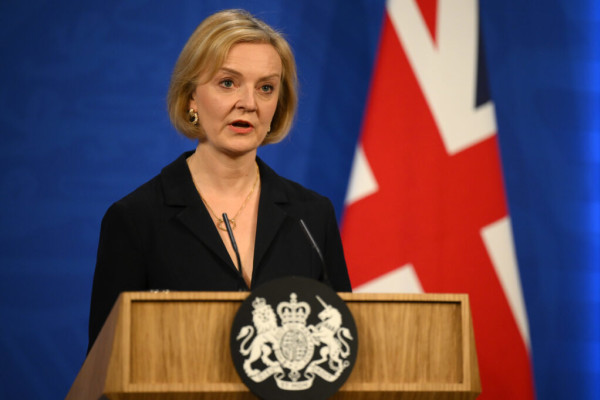A colossal failure of leadership - how Liz Truss went from hero to zero

A series of serious errors saw the bond markets take a battering and eventually led to the prime minster losing her job, writes Amin Rajan of Create-Research
‘Trussonomics’ was dead on arrival. But it took a while for it to receive the last rites.
By unceremoniously ditching her cherished signature tax cuts and co-architect, Kwasi Kwarteng, Liz Truss has suffered the worst humiliation for a UK prime minister since Sir Anthony Eden’s Suez Canal fiasco in 1956. These cuts were the centrepiece of her election manifesto for the leadership of the Conservative Party, after Boris Johnson was forced to resign.
Bond markets reacted violently once they digested the news that £45bn ($50bn) of tax handouts were to be funded by borrowing at a time when public finances were already in a dire state due to Covid-19. The IMF was none too pleased either. Both sterling and gilts tanked.
Fearing carnage in the gilts market that would wipe out the vital hedges protecting pension assets, the Bank of England was forced to come to the rescue with a £65bn facility. Ironically, this rescue came just as the central bank was finally starting to unwind its bond-buying programme in order to tackle surging inflation in the UK. Equally notable, the BT Pension Scheme, the fourth largest in the UK, lost a fifth of its net assets during the turmoil.
The worst was yet to come in the days that followed, as a series of unforced errors from Truss compounded the problem. The first was to use attack as a strategy instead of giving more details about her overall plan to win over sceptics. In her first speech as prime minister at the Conservative Party conference in Birmingham, Ms Truss resolutely defended her position, even after jettisoning proposed generous budget handouts for the rich at the eleventh hour.
“Growth, growth, growth” remained her mantra and tax cuts were the panacea. She mounted a spirited attack on the “anti-growth coalition” despite her own party’s failure to deliver growth over the past 12 years. Apparently, the real culprits were Scottish nationalists, Brexit deniers and north London liberals who spouted rubbish on the BBC. It would be laughable if it wasn’t so tragic to see this level of incompetence in action.
This led to the second error – inventing bogeymen without mentioning names. This is the last refuge for leaders who cannot win their case based upon its merits alone. The mini-budget was rushed through to please the 81,000 party voters who put her in power in the leadership election. It had not been subjected to the customary scrutiny by the Office of Budget Responsibility, which was created by the incoming Tory government in 2010 to prevent financial profligacy. This omission was either an act of defiance or tacit acceptance that the ‘growth’ budget was just another ‘greed’ budget.
Subsequently, upon seeing the initial dismal assessment of the OBR last week, Truss pressed the panic button: she instantly dismissed her chancellor and performed a dramatic U-turn. In his first statement to Parliament, the new Chancellor of the Exchequer, Jeremy Hunt, effectively buried the mini budget and drew a line under this disastrous misadventure.
His arrival in cabinet boosted the majority who could no longer tolerate the strenuous attempts by Suella Braverman, home secretary, to resist liberalising migration to promote economic growth. The cornerstone of the Brexit project has finally crumbled. She soon resigned. Two of Truss’s top three ministers had gone in as many weeks. Who’s next?
Before then, Ms Truss made heavy weather of her supply-side reforms in her conference speech without mentioning what they were and when they would be implemented. Growth in the UK since 2007 has been anaemic due to underinvestment in public and private sectors, inadequate forward spend on education and training and the resulting skills shortages. Long on stale sound bites, short on specifics: that’s how her hectoring speech came across, with little emotional connectivity with the wider audience outside the conference hall.
With her credibility in shreds, Ms Truss’s contrition was a long time coming. It finally took the form of a terse television interview on October 17. This was the third error: it showed little remorse for the collateral damage her misguided budget will inflict on the UK economy and society for years to come.
She violated every basic rule of Leadership 101 and when she finally announced her resignation on October 20, she left a country in crisis for her successor, Rishi Sunak.
Amin Rajan is CEO of Create-Research
This article has been updated since its initial publication



